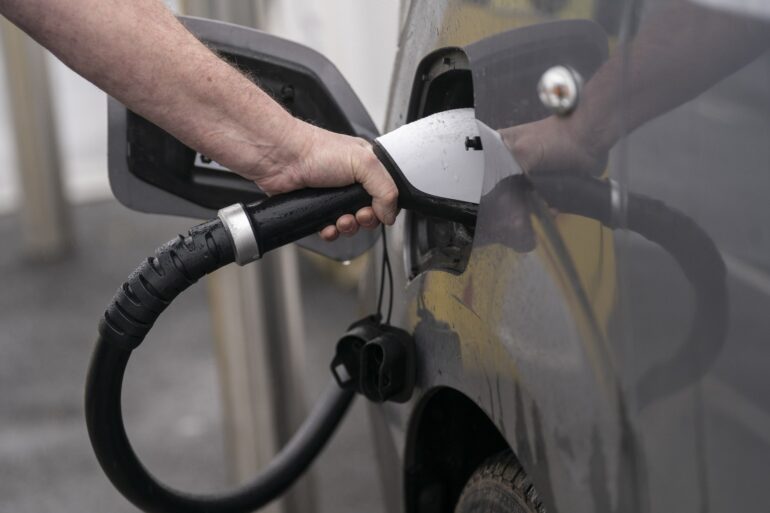-
 play_arrow
play_arrow
Kl 1 Radio Local radio for west Norfolk
-
 play_arrow
play_arrow
KL DISCO KL Disco Playing Disco Music from the 70's onwards.24/7
-
 play_arrow
play_arrow
KL COUNTRY KL COUNTRY Playing New and Classic Country Music 24/7
-
 play_arrow
play_arrow
KL ROX KL ROX The best of New and Classic Rock.24/7
-
 play_arrow
play_arrow
KL SUMMER Summer Vibes 24/7 from KL1 Radio across West Norfolk
-
 play_arrow
play_arrow
KL CLASSICAL Your Symphony Starts Here
-
 play_arrow
play_arrow
KL CHILL Just Chill!
-
 play_arrow
play_arrow
KL POP The Best POP Hits all day Long!
-
 play_arrow
play_arrow
KL XTRA KL XTRA
music_note

Shoppers are being urged to consider what protections they have when making payments, with the rise in “pay by bank” as an option.
Pay by bank allows people to quickly and securely pay money directly from their bank account without needing to enter the recipient’s bank details or use a card.
But Which? raised concerns that people may be unaware of a “protection gap” if something goes wrong with a purchase.
People may be familiar with using pay by bank to settle credit card balances or pay bills, and it has also become an option for retail purchases, the consumer group said.
But Which? warned that the option lacks the Section 75 and chargeback protections that people may have when using some other payment methods.
Under Section 75 of the Consumer Credit Act, a credit card company can be held jointly and severally liable for a purchase that turns out to be shoddy or does not materialise, in certain circumstances.
This means that a shopper could potentially get a refund from the credit card company if they cannot recoup their costs from the retailer.
People using a debit card or a credit card for purchases could also potentially get their money back via the voluntary chargeback scheme.
Which? said pay by bank is a “potential game changer” for businesses as they can sidestep card transaction fees and also benefit from receiving customer funds immediately.
There is also appeal for consumers too as refunds can be processed instantly, and card details are not shared when making a transaction – eliminating the risk of them being stolen or compromised.
People do have general purchase rights under the Consumer Rights Act, meaning that goods must be fit for purpose, as described and of satisfactory quality.
But Which? said these protections are not always easy to enforce and in some cases may end up with people needing to go to a small claims court.
People may also face difficulties in the event of a business going bust, particularly if there is an issue with a future-dated purchase such as a flight, a festival, or a household big ticket purchase such as a kitchen or a sofa, the consumer group said.
Jenny Ross, Which? Money editor, said: “Innovations like pay by bank present opportunities for businesses and consumers alike, but they’re not without risk, particularly as they lack the rigorous purchase protections you get when paying by card.
“We’re calling on the regulator to act to ensure consumers can use pay by bank with confidence, but in the meantime, we’d urge consumers to think carefully before using it to book events or make substantial purchases – for now, your good old-fashioned credit or debit card may be the best option.”
A spokesperson for banking and finance industry body UK Finance said: “There are a range of options for making payments online which provides customers with choice as to how they wish to pay. Different payment methods do come with different levels of protection and it’s worth being aware of these when shopping online, particularly when making higher value purchases.”
Riccardo Tordera-Ricchi, director of policy and government relations at the Payments Association, said: “Pay by bank offers real advantages – from lower merchant fees to faster settlement and improved security through reduced reliance on card details.
“But as it becomes more widely used, especially for high-value or future-dated purchases, it’s essential that consumers understand the protections associated with different payment methods.
“As payment options diversify, making informed choices is just as important as the technology behind them.”
Mr Tordera-Ricchi described Section 75 as “a powerful example of how regulatory frameworks can meaningfully protect consumers”.
Tom Burton, director of external affairs and public policy at bank payment company GoCardless, said: “Open banking payments are good news for British consumers: they offer bank-grade security measures, instant refunds, reduced fraud risk and, crucially, small businesses that use them don’t face the same high fees as they do for card acceptance. Lower merchant costs mean shoppers get cheaper prices – a real win-win.
“There is more to do though if open banking is to genuinely compete with cards, including building on the foundations of the consumer protections that are already in place. GoCardless is working hard to make that a reality for consumers and merchants by closely collaborating with the Government, regulators and others.”
Published: by Radio NewsHub

Similar posts
Upcoming shows

Chris Osler – Friday Afternoon Show
1:00 pm - 4:00 pm

Richard Dix – KL1 Drive
4:00 pm - 7:00 pm

emoviebox
7:00 pm - 8:00 pm

Richard Tree – Friday Folk
8:00 pm - 9:00 pm

Dave Setchfield – Nite KL1ub Part 1
9:00 pm - 10:00 pm
Message Us
Copyright The Mediasite UK - 2025








